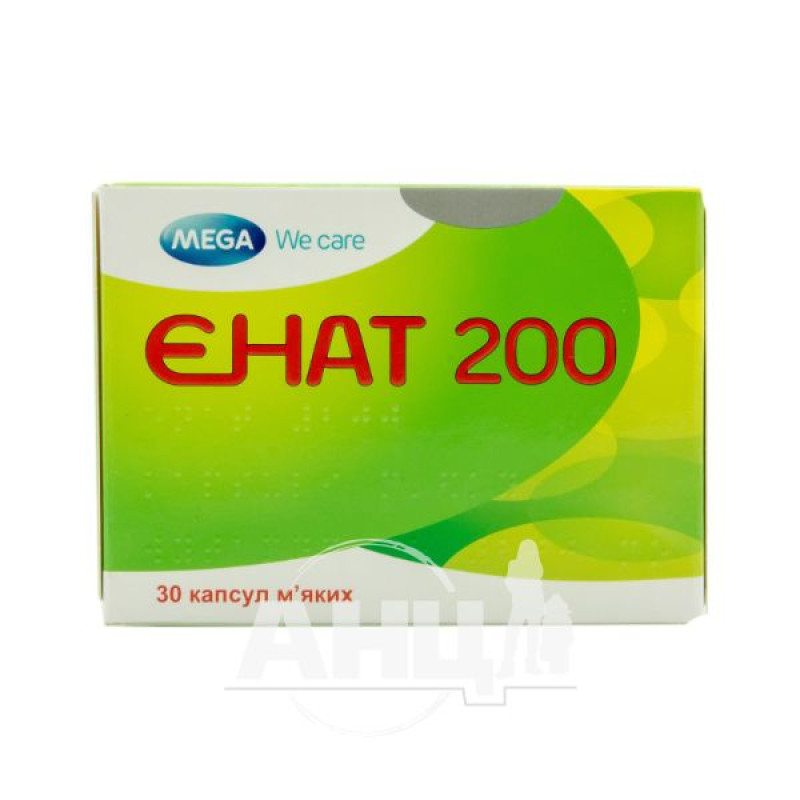Yenat 200 capsules 200 IU No. 30

The drug Yenat 200 is used as part of complex therapy to prevent disorders of embryonic development of the fetus, autonomic disorders, or as an adjuvant in the hormonal treatment of menstrual cycle disorders.
Atrophic processes in the mucous membrane of the respiratory tract and digestive system. Used as an adjuvant for neurosensory hearing disorders.
Neurasthenia in conditions accompanied by exhaustion, muscular dystrophy and muscle atrophy.
Degenerative and proliferative changes in the joints and fibrous tissue of the spine and large joints; secondary muscle weakness and myopathy in chronic arthritis, muscle weakness due to frequent relapses of discogenic blockades.
It is used as an adjunct to certain endocrine disorders and as a treatment in combination with vitamin A for male infertility.
Eating disorders, malabsorption syndrome, nutritional anemia. Used as part of the therapy of chronic hepatitis.
It is used as an adjuvant in the treatment of some cases of periodontal disease.
Plastic induration of the penis, kraurosis of the vulva, scleroderma, eczema, balanitis.
Used as part of antioxidant therapy.
Composition
Active ingredient: 1 capsule contains vitamin E – 200 IU (D-alpha-tocopherol acetate).
Excipients: soybean oil; gelatin capsule: gelatin, glycerin, purified water.
Contraindication
Hypersensitivity to the active substance and to any components of the drug; cardiosclerosis; acute period of myocardial infarction; thyrotoxicosis; hypervitaminosis E; hypersensitivity to peanut or soy. Children's age up to 12 years.
Method of application
Vitamin E is taken orally after meals, the dose is determined individually, depending on the type of disease, the course of the disease, the patient's condition and the child's age after consulting a doctor. To achieve the prescribed dose, the drug should be used in the appropriate dosage. The capsule should be swallowed whole, washed down with sufficient water.
Features
Pregnant women
The medicine can be used under the supervision of a doctor in recommended doses during pregnancy or breastfeeding.
Children
The drug is contraindicated in children under 12 years of age.
Drivers
When using the drug, side effects such as visual disturbances and dizziness may occur. In such cases, it is necessary to refrain from driving or using other mechanisms.
Overdose
Symptoms: Taking high doses of vitamin E (400–800 IU per day for a long time) may cause visual disturbances, diarrhea, dizziness, headache, nausea or stomach cramps, and extreme tiredness or weakness.
Very high doses (more than 800 IU for a long time) can provoke bleeding in patients with vitamin K deficiency; they can disrupt the metabolism of thyroid hormones and increase the risk of thrombophlebitis and thromboembolism in susceptible patients. Increased creatine kinase activity, increased serum cholesterol and triglyceride concentrations, and increased urinary estrogen and androgen levels are possible.
Treatment. Treatment of overdose consists of removing vitamin E from the body and providing symptomatic therapy.
Side effects
Reporting suspected adverse reactions after registration of a medicinal product is an important procedure. This allows for continued monitoring of the benefit/risk balance of the medicinal product. Healthcare professionals are asked to report all suspected adverse reactions to the State Expert Center of the Ministry of Health of Ukraine.
Interaction
Iron increases the daily requirement for vitamin E. Vitamin E has been reported to increase the bleeding tendency in patients with vitamin K deficiency or those taking anticoagulants, therefore it is recommended to monitor prothrombin time and international normalized ratio (INR) to detect any changes in hemostasis. Dosage adjustment of anticoagulants may be necessary during and after treatment with Vitamin E.
Vitamin E may increase the risk of thrombosis in patients taking estrogens.
Vitamin E cannot be used together with iron preparations, silver, alkaline agents (sodium bicarbonate, trisamine), and indirect anticoagulants (dicoumarin, neodicoumarin).
Vitamin E enhances the effect of steroidal and nonsteroidal anti-inflammatory drugs (diclofenac sodium, ibuprofen, prednisolone); reduces the toxic effect of cardiac glycosides (digitoxin, digoxin), vitamins A and D.
Vitamin E and its metabolites have an antagonistic effect on vitamin K.
Vitamin E increases the effectiveness of antiepileptic drugs in patients with epilepsy.
Cholestyramine, colestipol, and mineral oils reduce the absorption of vitamin E.
When taking high doses of vitamin E, vitamin A reserves in the body may decrease.
Storage conditions
Store in original packaging, at a temperature not exceeding 25ºС.
Keep out of reach of children.
Shelf life: 3 years.
There are no reviews for this product.
There are no reviews for this product, be the first to leave your review.
No questions about this product, be the first and ask your question.
